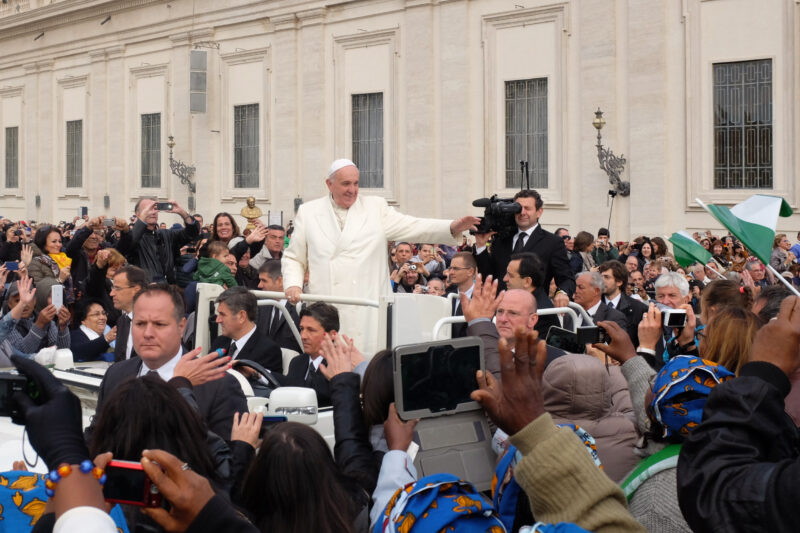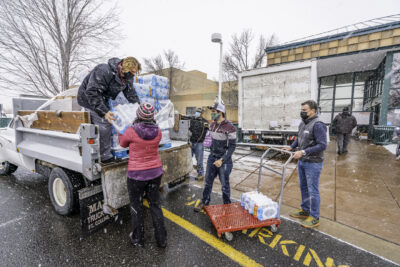2024 National Migration Week: September 23-29

The World Day of Migrants and Refugees (WDMR) is an opportunity for global church and the Catholic faithful to engage in prayer, reflection, and action on behalf of our brothers and sisters who are forced to flee their homes. The theme for this year’s WDMR is God walks with his people, which “focuses on the itinerant dimension of the Church, with special attention to migrant brothers and sisters, who are a contemporary icon of the Church on the move.” National Migration Week is a uniquely US-based celebration that builds on the ideas put forth in WDMR and shaped accordingly to American public. In 2024 we will celebrate National Migration Week September 23-29, which culminates with WDMR that Sunday the 29th.
One lens through which we can understand the theme used for this year’s migration message and its importance for us as Catholics is through the idea of accompaniment.
Accompaniment and the Catholic Church
In his latest message for the World Day of Migrants and Refugees, Pope Francis emphasizes the theme “God Walks with His People.” This theme serves as a reminder that God consistently accompanies His people throughout history, guiding and providing for them, much like He did for the Israelites. Pope Francis draws a parallel between the experiences of migrants today and the ancient Israelites’ journey from slavery to freedom, highlighting the similar challenges of oppression and hardship they face.
Pope Francis states, “Like the people of Israel in the time of Moses, migrants often flee from oppression, abuse, insecurity, discrimination, and lack of opportunities for development. Similar to the Jews in the desert, migrants encounter many obstacles in their path: they are tried by thirst and hunger; they are exhausted by toil and disease; they are tempted by despair.”
As Catholics, we are commanded by Jesus (MT 25) to provide support and care for the most vulnerable among us, including the naked, the hungry, the imprisoned, and the stranger. Through this outreach, we are called to accompany migrants at all stages of their journey: from the point of origin, through transit, and to their final destination.
What is Accompaniment?
 In the context of migration, accompanying migrants involves helping, supporting, serving, and advocating for them from the beginning of their migration experience to its end. Accompaniment fosters mutual understanding and provides formation and leadership opportunities for both directly impacted communities and their supporters.
In the context of migration, accompanying migrants involves helping, supporting, serving, and advocating for them from the beginning of their migration experience to its end. Accompaniment fosters mutual understanding and provides formation and leadership opportunities for both directly impacted communities and their supporters.
Examples of accompaniment include:
- Assist undocumented immigrants with their regular check-ins with ICE or attending mandatory immigration hearings and court proceedings.
- Become involved as a volunteer at your local Catholic Charities
- Nurture the idea of encounter by organizing an event at your parish and invite a migrant to tell their story to your fellow Catholics.
- Become a foster parent for an unaccompanied child! Email us today and provide a child a safe place to live.
Through accompaniment, we offer comfort, and spiritual and emotional support. It builds solidarity with immigrants and their families, and bridges understanding and mutual interest within communities.
Why is Accompaniment Important for the Catholic Church?
Accompaniment is a key concept in Catholic Social Teaching. It involves providing emotional, physical, and spiritual support to people in need and walking in their shoes, recognizing the human dignity and experience of every person.
It is helpful here to reflect on the Holy Father’s 2018 migration day message, where he emphasized that “the Lord entrusts to the Church’s motherly love every person forced to leave their homeland in search of a better future.” He highlighted the importance of welcoming, supporting, protecting, and integrating immigrants as a high priority for the Church. These themes, when put into practice, are vital ways in which accompaniment becomes concrete.
Are there examples of accompaniment in the Bible?
The call to accompany and support immigrant is based on the rich heritage of Scripture and the Church’s teaching. The patriarchs of the Church themselves were nomads who were settled by the hand of God in the time of Abraham. In Genesis 18, Abraham and his family extended bounteous hospitality to three strangers who were actually a manifestation of the Lord, which became a paradigm example of the hospitality that we are called to offer strangers and those in need.
Years later the Jewish people migrated to Egypt, where they suffered oppression and were delivered once again by God’s hand. From this experience comes a deep appreciation for the migrant journey as highlighted in the words of Scripture: “You shall treat the stranger who resides with you no differently than the natives born among you, have the same love for him as for yourself; for you too were once strangers in the land of Egypt” (Leviticus 19:34). Jesus echoes this tradition when he proclaims, “For I was hungry and you gave me food, I was thirsty and you gave me drink, a stranger and you welcomed me” (Matthew 25:35). Throughout the years the Church has remained faithful to this call to care for and solidarity with immigrants of all kinds and has worked to respond accordingly.
